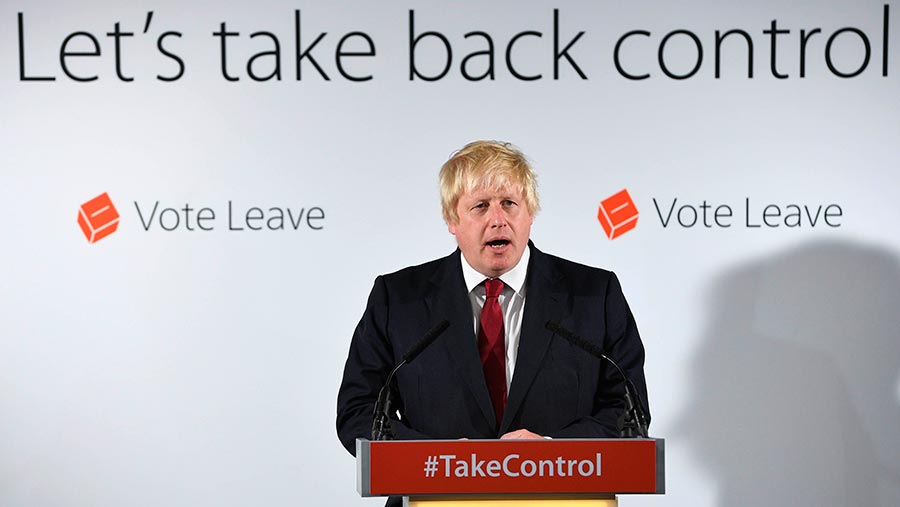Boris Johnson’s £350m Brexit pledge rekindles farm subsidies row
 © Xinhua News Agency/REX/Shutterstock
© Xinhua News Agency/REX/Shutterstock The level of spending on agriculture is at the centre of a political row on UK funding priorities post-Brexit.
Sir David Norgrove, chairman of the UK Statistics Authority, said he was “surprised and disappointed” that foreign secretary Boris Johnson had repeated his assertion that the UK would be able to “take back control” of roughly £350m/week after we leave the European Union.
Mr Johnson said it would be “a fine thing if a lot of that money went to the NHS”.
See also: 9 Brexit farming policies – where are we one year on?
But Sir David said the Conservative MP’s public spending claim “confused” the size of the UK’s annual gross and net contributions to the EU’s budget.
He added: “It assumes that payments currently made to the UK by the EU, including for example for the support of agriculture and scientific research, will not be paid by the UK government when we leave.”
The watchdog, an independent statutory body, described Mr Johnson’s decision to repeat claims that the UK will be able claw back £350m a week after Brexit as a “clear misuse of figures”.
‘Wilful distortion’
But foreign secretary Mr Johnson hit back, accusing Sir David of “wilful distortion” of his 4,000-word article in the Daily Telegraph on Saturday (16 September).
In a letter to Sir David, Mr Johnson said his comments were “very different from claiming there would be an extra £350m available for public spending and I am amazed that you should impute such a statement to me”.
Mr Johnson added: “Once we leave the EU we will take back control of all such UK-funded spending, and, although of course I have no doubt that we will continue to spend significantly on UK priorities such as agriculture and research, that spending will be done under UK control.”
The Vote Leave campaign claimed during last year’s EU referendum that the UK would be able to take back control of £350m it gives to the EU each week.
Rebate
However, this figure has been widely criticised by analysts as it failed to take into account the money the UK receives from the EU in the form of a rebate.
The amount sent to the EU in 2014 was £276m/week, after the rebate was deducted. Last year, this figure fell to £252m/week after the rebate.
Economists predict that after Brexit the Treasury will have to reduce the level of funding the EU currently sends to the UK for agriculture – roughly £3bn/year – if it wants to spend more money on other priorities, such as the NHS, education and national security.
The Conservative government has committed to guarantee the current level of financial support for UK farmers until 2022. But after that, the level of funding for agriculture is unclear.
Pro-Brexit farm minister George Eustice has said the leave vote would free up money in the public purse for the Treasury to fund agriculture to “at least the same level”. But since the Brexit vote, Mr Eustice has told wealthy landowners they face cuts to their subsidies.
Defra ministers have warned farmers to expect a major policy overhaul when EU subsidies stop.
Last week, Defra secretary Michael Gove said the “lion’s share” of farm subsidies would go to farmers to protect the environment.
